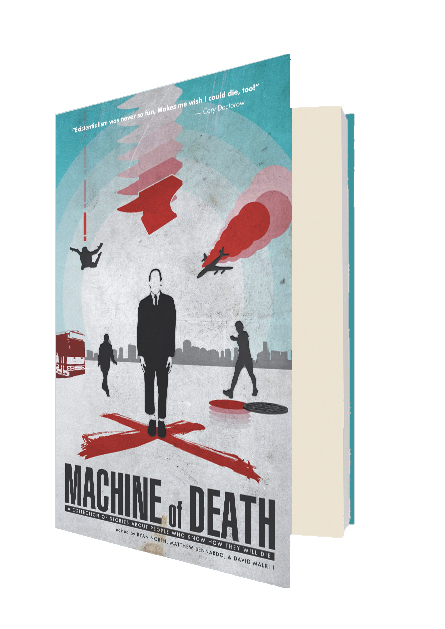Given a sample of blood, a machine prints out the cause of a person’s death on a small piece of paper. But the results are brief and deceptive: old age can mean getting killed by an elderly person. “Almond” is narrated by a lab technician in Cleveland who begins to record a maintenance log for a machine of death (as the device is called), but who is soon so overwhelmed by the monotony of the job that he spends the year contemplating, say, how a word so seemingly innocuous as almond could be fatal. When a man receives joy as a readout from the machine, the technician envisions a death from intense ecstasy, only to discover later that the man has died when struck by a car driven by a woman named Joy. Horrified, he wonders why the machine would choose this detail over something more appropriate, like crash.
On the surface, it’s easy to say that this story and the others in Machine of Death: A Collection of Stories About People Who Know How They Will Die demonstrate a skepticism toward technology. As his last act in “Almond,” in a sleep-deprived rage, the lab technician destroys the machine. (It’s a symbolic gesture.) The machine itself is the red herring, however: language is the technology that deserves this suspicion. The machine shows us only that language can fail. It’s fairer to say that the rules of the machine, which allow for imaginative interpretations, give the writers of these stories freedom to challenge language, word by word. In the meantime, their characters parse the machine’s words to the point of obsession, imagining all the possibilities of their eventual demises, knowing that a readout does not refer only to its most apparent meaning. What if it’s a metaphor? What if it refers to a line of poetry?
The most extreme example is “Heat Death of the Universe,” a meditation on cosmology and a high-school love story (an oddly appropriate combination). The narrator and his girlfriend must balance the normal pressures of adolescence with apocalyptic visions of their deaths. She has received nuclear bomb, he the titular fate. A bookish outcast fascinated by the cosmology of Stephen Hawking, the narrator can’t understand the logistics of his readout: heat death presupposes the temperature of the universe lowering to the point where it can no longer sustain life—suggesting either that the narrator will live for an impossibly long time or that the universe has only a few years left before it freezes everybody out. heat death of the universe carries a precise definition in the context of thermodynamics, but, used by the machine, it doesn’t mean anything at all.
The characters’ problem throughout the collection is that they see the machine as a promise of absolute knowledge; evidently, that promise is false. Faced with predictions that may well refer to the least consequential details of a fatal event, they fill in the gaps with their own imaginations, make up a cause of death, convince themselves it’s true. “The universe doesn’t work by word games,” someone laments near the end of the book, acknowledging a fundamental problem of expression: when we describe the world, we distort it.
People do work by word games, though, and play with them as well, and that play shapes our experience of the universe, however imperfect our ability to describe it, however inevitably language might fail. When a machine challenges the conventions of language, it alters the way we view the world, upheaving our sense of stability and, in extreme cases, inciting chaos. In light of this dependence, individuals must continually evolve to prevent technology from failing them; the characters who demonstrate this adaptability in Machine of Death are usually the ones who survive to the end of their story. Perhaps, then, the machine functions not as a duplicitous prophet but as a mechanism designed to increase our capacity for language. It feeds our desire to know more about our own personal universe, encouraging us to furnish it with our own words.
—Andrés Carrasquillo





